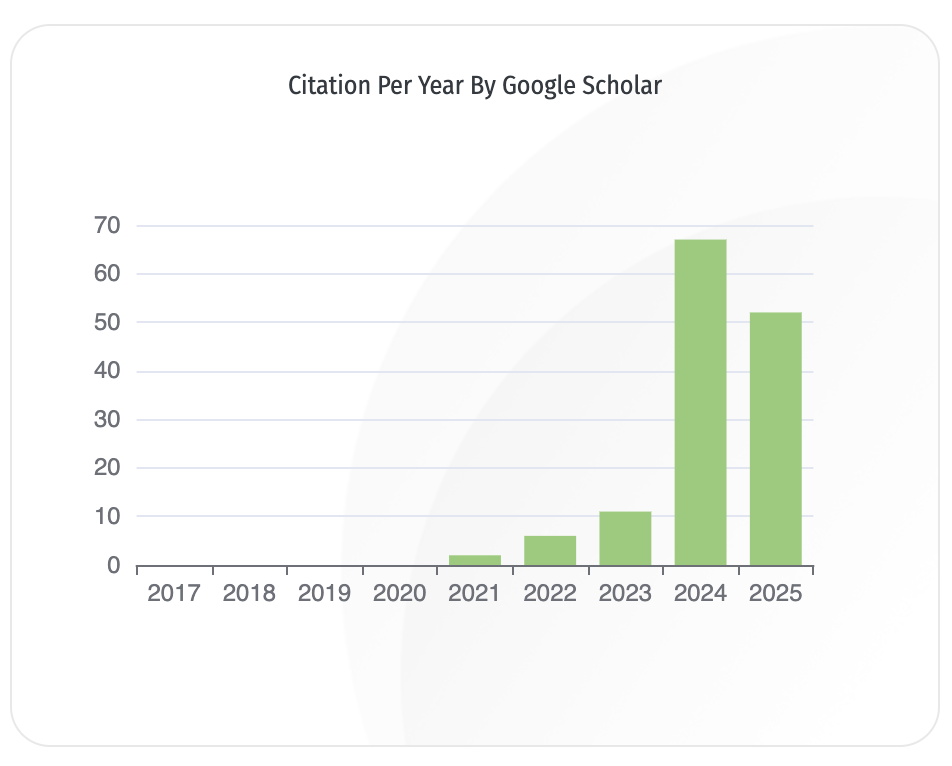University student participation in physical activity toward lung vital capacity differences: comparative study of smokers and non-smokers
DOI:
https://doi.org/10.26740/bimaloka.v5i2.40042Keywords:
active person, lung vital capacity, respiration, smokingAbstract
Smoking is a known risk factor for impaired lung function, even among physically active individuals. The harmful substances contained in cigarettes are known to disrupt lung function and damage lung tissue, which, over time, can reduce vital lung capacity. On the other hand, regular physical activity has been proven to enhance lung capacity. However, there is still a lack of research specifically comparing the vital lung capacity between physically active male smokers and non-smokers. This study aimed to determine the differences in vital lung capacity between physically active male smokers and non-smokers. The study involved 50 male university students aged 20–23 who regularly exercised twice weekly. Subjects were divided into 25 smokers and 25 non-smokers with similar morphological characteristics. Vital lung capacity was measured using a digital spirometer connected to a computer. The results showed that the non-smoker group had a significantly larger vital lung capacity than the smoker group, with an average difference of 0.41 liters (p<0.05). These findings indicate that although both groups were physically active, smoking habits still negatively impacted vital lung capacity. Although the difference may not be fatal from a physiological standpoint, it can potentially affect sports performance, particularly in disciplines that rely heavily on respiratory capacity, such as aerobic-based sports and freediving.
References
Caliri, A. W., Tommasi, S., & Besaratinia, A. (2021). Relationships among smoking, oxidative stress, inflammation, macromolecular damage, and cancer. Mutation Research, 787, 108365. https://doi.org/10.1016/J.MRREV.2021.108365
de Paula Santos, U., Arbex, M. A., Braga, A. L. F., Mizutani, R. F., Cançado, J. E. D., Terra-Filho, M., & Chatkin, J. M. (2021). Environmental air pollution: respiratory effects. Jornal Brasileiro de Pneumologia, 47(1), e20200267. https://doi.org/10.36416/1806-3756/E20200267
Dondi, A., Carbone, C., Manieri, E., Zama, D., Del Bono, C., Betti, L., Biagi, C., & Lanari, M. (2023). Outdoor Air Pollution and Childhood Respiratory Disease: The Role of Oxidative Stress. International Journal of Molecular Sciences, 24(5), 4345. https://doi.org/10.3390/IJMS24054345
Edwards, R. (2004). The problem of tobacco smoking. BMJ, 328(7433), 217–219. https://doi.org/10.1136/BMJ.328.7433.217
Fuertes, E., Carsin, A. E., Antó, J. M., Bono, R., Corsico, A. G., Demoly, P., Gislason, T., Gullón, J. A., Janson, C., Jarvis, D., Heinrich, J., Holm, M., Leynaert, B., Marcon, A., Martinez-Moratalla, J., Nowak, D., Pascual Erquicia, S., Probst-Hensch, N. M., Raherison, C., … Garcia Aymerich, J. (2018). Leisure-time vigorous physical activity is associated with better lung function: the prospective ECRHS study. Thorax, 73(4), 376–384. https://doi.org/10.1136/THORAXJNL-2017-210947
Heydari, G., Hosseini, M., Yousefifard, M., Asady, H., Baikpour, M., & Barat, A. (2015). Smoking and Physical Activity in Healthy Adults: A Cross-Sectional Study in Tehran. Tanaffos, 14(4), 238. https://pmc.ncbi.nlm.nih.gov/articles/PMC4841990/
Kaczynski, A. T., Manske, S. R., Mannell, R. C., & Grewal, K. (2008). Smoking and Physical Activity: A Systematic Review. American Journal of Health Behavior, 32(1), 93–110. https://doi.org/10.5993/AJHB.32.1.9
Kress, S., Wigmann, C., Zhao, Q., Herder, C., Abramson, M. J., Schwender, H., & Schikowski, T. (2022). Chronic air pollution-induced subclinical airway inflammation and polygenic susceptibility. Respiratory Research, 23(1), 265. https://doi.org/10.1186/S12931-022-02179-3
Li, Y., & Hecht, S. S. (2022). Carcinogenic components of tobacco and tobacco smoke: A 2022 update. Food and Chemical Toxicology, 165, 113179. https://doi.org/10.1016/J.FCT.2022.113179
Moslemi-Haghighi, F., Rezaei, I., Ghaffarinejad, F., Lari, R., & Pouya, F. (2011). Comparison of Physical Fitness among Smoker and Non-Smoker Men. Addiction & Health, 3(1–2), 15. /pmc/articles/PMC3905518/
Omare, M. O., Kibet, J. K., Cherutoi, J. K., & Kengara, F. O. (2021). A review of tobacco abuse and its epidemiological consequences. Journal of Public Health 2021 30:6, 30(6), 1485–1500. https://doi.org/10.1007/S10389-020-01443-4
Osullivan, B., Scully, P., Curtin, R. J., & Plant, B. J. (2021). A study to assess smoking habits and smoking exposure in sportspeople. QJM: An International Journal of Medicine, 114(5), 306–310. https://doi.org/10.1093/QJMED/HCAA189
Putra, K. P., Karwur, F. F., & Hidayati, N. W. (2020). VO2max Berkorelasi Negatif dengan Kemampuan Tahan Nafas (Apnea). JOSSAE : Journal of Sport Science and Education, 5(2), 139. https://doi.org/10.26740/jossae.v5n2.p139-147
Putra, K. P., Pratama, R. P., & Nugroho, K. P. A. (2020). Kapasitas Vital Paru Berkorelasi Positif dengan Kemampuan Tahan Nafas pada Laki-Laki Usia 19-25 Tahun. JOSSAE : Journal of Sport Science and Education, 5(1), 25. https://doi.org/10.26740/jossae.v5n1.p25-32
Ramalho, S. H. R., & Shah, A. M. (2021). Lung function and cardiovascular disease: A link. Trends in Cardiovascular Medicine, 31(2), 93–98. https://doi.org/10.1016/J.TCM.2019.12.009
Rolfe, S. (2019). The importance of respiratory rate monitoring. British Journal of Nursing, 28(8), 504–508. https://doi.org/10.12968/BJON.2019.28.8.504
Ruvuna, L., & Sood, A. (2020). Epidemiology of Chronic Obstructive Pulmonary Disease. Clinics in Chest Medicine, 41(3), 315–327. https://doi.org/10.1016/J.CCM.2020.05.002/ASSET/98837B01-26DC-4939-BB18-D4501AE6FC42/MAIN.ASSETS/GR2.SML
Saiphoklang, N., Poachanukoon, O., & Soorapan, S. (2020). Smoking characteristics and lung functions among university athletes. Scientific Reports 2020 10:1, 10(1), 1–6. https://doi.org/10.1038/s41598-020-77248-y
Sapada, E., Asmalinda, W., & Siti Khadijah Palembang, S. (2023). Vital Lung Capacity in Active Smokers. Jurnal Aisyah : Jurnal Ilmu Kesehatan, 8(2), 1067–1072. https://doi.org/10.30604/jika.v8i3.2032
Sukadiono, S., Zahrah, S. F., Nasrullah, D., Supatmi, S., & Fitriyani, V. R. (2022). The effect of physical exercise on vital lung capacity in Tapak Suci athletes. Jurnal Keolahragaan, 10(2), 166–174. https://doi.org/10.21831/jk.v10i2.52392
Tainio, M., Jovanovic Andersen, Z., Nieuwenhuijsen, M. J., Hu, L., de Nazelle, A., An, R., Garcia, L. M. T., Goenka, S., Zapata-Diomedi, B., Bull, F., & Sá, T. H. de. (2021). Air pollution, physical activity and health: A mapping review of the evidence. Environment International, 147, 105954. https://doi.org/10.1016/J.ENVINT.2020.105954
Downloads
Published
How to Cite
Issue
Section
License
Copyright (c) 2025 Kukuh Pambuka Putra, Muchamad Arif Al Ardha, Suthana Tingsapat, Cahyo Wibowo, Agam Allende Sidi

This work is licensed under a Creative Commons Attribution-NonCommercial-ShareAlike 4.0 International License.
 Abstract views: 90
,
Abstract views: 90
, PDF Downloads: 70
,
PDF Downloads: 70
, PDF Downloads: 47
PDF Downloads: 47






